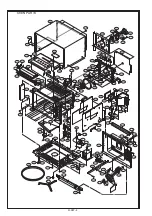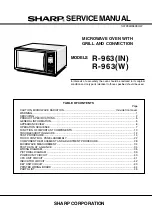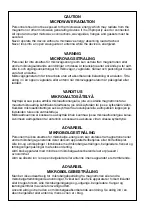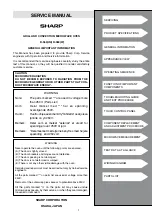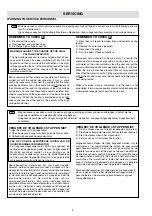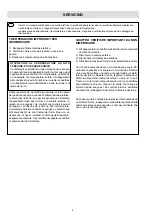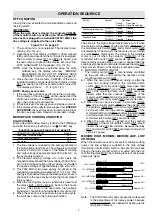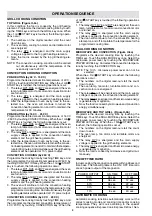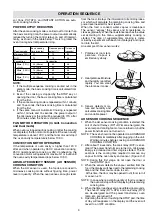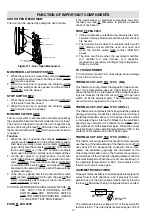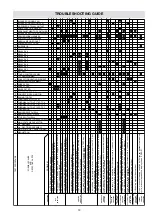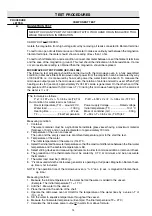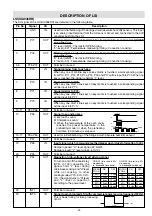
11
the asymmetric rectifier is 1.7 KV. D1 and D2 of the
asymmetric rectifier or high voltage rectifier are shorted
when the each peak reverse voltage goes beyond the
each rated peak reverse voltage. (The process of the
blowing the fuse F2 F8A.)
1. The high voltage rectifier is shorted by some fault when
microwave cooking or dual cooking.
2. The peak reverse voltage of D2 of the rectifier goes
beyond the rated peak reverse voltage 1.7 KV in the
voltage doubler circuit.
3. D2 of the rectifier is shorted.
4. The large electric currents flow through the high volt-
age winding of the high voltage transformer.
5. The large electric currents beyond 8A flow through the
primary winding of the high voltage transformer.
6. The fuse F2 F8A blows by the large electric currents.
7. The power supplying to the high voltage transformer is
cut off.
NOISE FILTER
The noise filter assembly prevents radio frequency inter-
ference that might flow back in the power circuit.
TURNTABLE MOTOR TTM
The turntable motor rotates the turntable.
FAN MOTOR FM
The fan motor drives a blade which draws external cool air.
This cool air is directed through the air vanes surrounding
the magnetron and cools the magnetron. This air is chan-
nelled through the oven cavity to remove steam and
vapours given off from heating food. It is then exhausted
through the exhausting air vents of the oven cavity.
CONVECTION MOTOR CM
The convection motor drives the convection fan and
provide the heated air.
GRILL HEATING ELEMENT GH
The grill heating elements are provided to brown the food
and are located on the top of the oven cavity.
CONVECTION HEATING ELEMENT CH
The convection heating element situated at the rear of the
oven cavity. It is intended to heat air driven by the
convection fan. The heated air is kept in the oven and
force-circulated and reheated by the convection heating
element.
CONVECTION COOKING SYSTEM
This oven is designed with a hot air heating system where
food is heated by forced circulation of the hot air produced
by the grill heaters. The air heated by the grill heating
elements is circulated through the convection passage
provided on the outer casing of the oven cavity by means
of the convection fan which is driven by the convection
motor. It is then enters the inside of the oven through the
vent holes provided on the back side of the oven. Next, the
hot air heats the food on the turntable and leaves the oven
cavity through the vent in the oven cavity rear wall. In this
way, the hot air circulates inside the oven cavity to raise its
temperature and, at the same time, comes into contact
with the food being cooked. When the temperature inside
the oven cavity reaches the selected temperature, the
heating elements are de-energized. When the tempera-
ture inside the oven cavity drops below the selected
temperature, the heating elements are energized again. In
this way, the inside of the oven cavity is maintained at
approximately the selected temperature. When the con-
vection time reaches “0”, the heating elements are de-
energized and the convection fan stops operating and the
oven shuts off. At that time if the cavity air temperature has
risen above 120˚C, the fan motor remains rotating. Auto-
matically the fan motor will be shut down at low tempera-
ture (less than 105˚C).
Figure D-2. Convection Cooking System
FIRE SENSING FEATURE
The oven will stop its operation when there is a fire in the
oven cavity in microwave cooking condition.
LSI measures the voltage across the temperature meas-
urement circuit intermittently within 32-seconds time base
since the oven is started in microwave cooking condition.
The oven will stop its operation when the difference of the
voltage is more than 0.39 volts in microwave cooking
condition.
1. Within a 32-seconds base, the thermistor is energized
for 2 seconds. At that time, the voltage across the
temperature measurement circuit is measured.
2. The oven carries out the procedure above again. If the
second voltage is 0.39V higher than first voltage, LSI
judges it is a fire in the oven cavity and stop the oven.
3. When LSI judges it is a fire in the oven cavity, LSI will
switch off the relays to high voltage transformer and fan
motor and LSI stops counting down.
IMPORTANT:
During sensor cooking operation, the fire sensing
operation sequence will not begin until the AH sensor
has detected vapours and initiated a sensor cooking
cycle.
Door
Oven Cavity
Grill Heating
Elements
Convection
Passage
Cooling
Fan
Convection
Motor
Convection
Fan
Turntable
Turntable Motor
Roller Stay
Convection
Heating Element
THERMISTOR
Sensing
Voltage
ON
OFF
ON
OFF
30
32 (sec.)
Sensing the voltage across temperature measurement circuit.
FUNCTION OF IMPORTANT COMPONENTS


